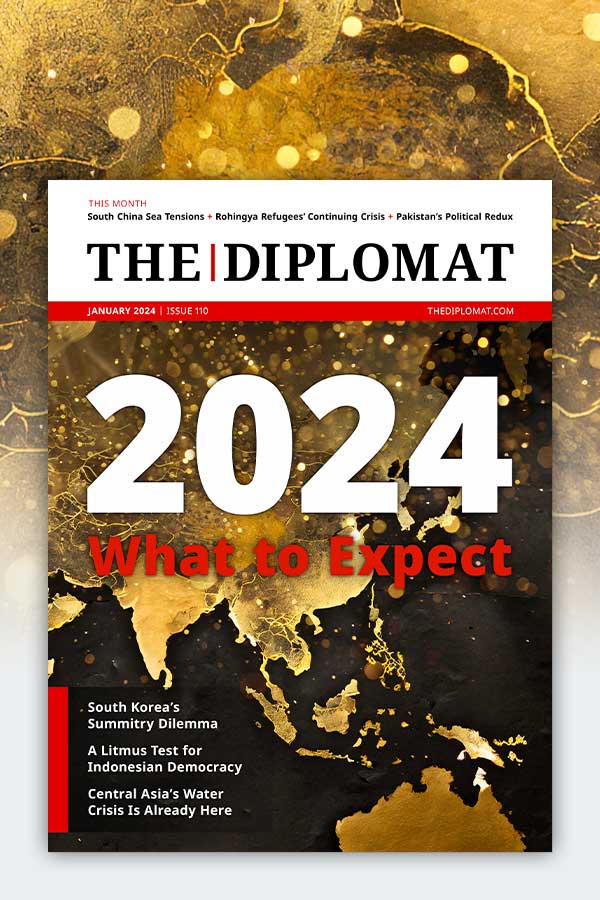| Welcome to the latest issue of Diplomat Brief. This week our top story explores the mood in Ayodhya, India, ahead of the consecration of the controversial Ram Temple. We also have an interview with Richard M. Eaton, professor of history at the University of Arizona, about the historical reality of Hindu temple desecrations in India. |
| Story of the week | ![[object Object]](https://thediplomat.com/diplomat-brief/2024/vol03/images/feature.jpg?v=1) | Politics Ram Temple Stirs Religious Fervor as India Readies for Election FeverWhat Happened: Ayodhya has been the site of religious conflict for decades, with Hindu groups claiming a 16th century mosque had been built on the birthplace of the deity Ram. In 1992, a mob razed the Babri Masjid, sparking a decades-long legal battle that ended in 2019, when India’s Supreme Court gave the go-ahead to build a Hindu temple on the site. The government of Prime Minister Narendra Modi has claimed credit for the temple, and preparations are underway to host a grand consecration ceremony on January 22. Hindutva groups will broadcast the event, to be attended by Modi and other BJP leaders, on giant screens in cities across India. Our Focus: “Everybody is lost in the spectacle of Lord Ram’s temple. But I want to ask the government and the media, at what cost is this temple being built,” a local business leader said. Shops and homes have been demolished by the thousands to revamp the city. Unsurprisingly, the demolition drive fell disproportionately on Ayodhya’s Muslim minority. “They [the authorities] have tried many things to remove us from this place, but my family is not going anywhere. They have to kill us if they want to occupy this place,” said one local Muslim, caretaker of a mosque that was partially torn down. What Comes Next: Notably, the temple’s construction will not actually be completed until 2027 at the earliest. That gives the timing of this consecration – around three months before India goes to the polls – a decidedly political coloring. And it seems to be working. “Modi and [Uttar Pradesh Chief Minister] Yogi are mahapurush (great men). It is the blessing of Ram that these two have become our saviors. I am their devotee as much as I am of Ram-ji,” said one local, who has made advocating for the temple his life’s work. But if Hindus view Modi as their “savior,” other religious groups feel marginalized. Read this story |
| Behind the News | INTERVIEW Richard M. EatonRichard M. Eaton, professor of history at the University of Arizona and author of “India in the Persianate Age: 1000-1765,” on why some Hindu temples were looted and destroyed – by Hindu and Muslim conquerors alike: “If we look at the long sweep of precolonial history and note the contexts in which temples were desecrated, it is clear that state authorities left India’s thousands of ordinary temples alone, simply because they were politically irrelevant… But royal temples were always subject to attack by state enemies, regardless of their religion.” Read the interview |
| This Week in Asia | Northeast Asia Taiwan’s DPP Keeps the Presidency (to China’s Dismay)Lai Ching-te, the candidate of the ruling DPP, won Taiwan’s presidential election on Saturday, albeit with just 40 percent of the vote. That comes as a blow to Beijing, which has consistently refused to talk with the current DPP administration, claiming it is “pro-independence.” So far China’s response has been fairly muted, perhaps because the DPP’s triumph was limited; it kept the presidency but lost its legislative majority. Already, though, China has pried away yet another of Taiwan’s diplomatic allies: Nauru made the switch just 2 days after the poll. Find out more | South Asia Bhutan’s New GovernmentFollowing Bhutan’s fourth general election last week, the People’s Democratic Party (PDP) is set to form the next government, with PDP chief Tshering Tobgay as prime minister. In a region plagued by democratic backsliding, Bhutan’s competitive polls were a breath of fresh air. The elections were all about the economy, and that will be priority number one for Tobgay as he takes office. Find out more | Southeast Asia Philippines to Upgrade South China Sea OutpostsThe Philippines’ military chief Romeo Brawner said this week that the country plans to upgrade the nine islands and features that it occupies in the South China Sea. Brawner told reporters that the upgrades could include the installation of desalination equipment and communications devices, and other improvements to make them more habitable for troops. The announcement comes at a time of growing friction with China in contested waters, which has seen a number of dangerous confrontations between Philippine and Chinese vessels, and bilateral relations decline to their lowest point in nearly a decade. The features slated for improvements include Thitu Island, the largest Philippine-occupied island, and Second Thomas Shoal, the focus of many of the recent stand-offs. Find out more | Central Asia Kyrgyz Government Pushes Media CrackdownOver the course of two days, at least 11 journalists were detained in Kyrgyzstan as the authorities pursue a new set of criminal cases targeting local media outlets with allegations of “war propaganda” in the case of 24.kg and issuing “calls for mass unrest” in the case of Temirov Live and its associated outfits. Details are thin but the raids and detentions fit into a pattern of pressure targeting Kyrgyzstan’s best independent local outlets. Find out more |
| Visualizing APAC |  | Source: Chinese Loans to Africa Database China’s lending to Africa has varied wildly over the last 20 years. Will the pandemic years be yet another aberration, or a new normal? See the full picture |
|  |
![[object Object]](https://thediplomat.com/diplomat-brief/2024/vol03/images/feature.jpg?v=1)

